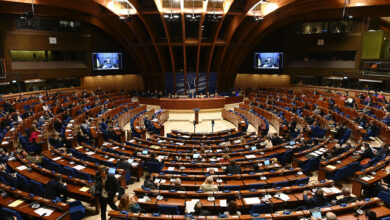This year on 31 October, as many folks are out celebrating Halloween, the world’s population is expected to hit 7 billion people, according to estimations by the United Nations Population Fund (UNFPA).
As the global population has increased by roughly 1 billion every 12 years since 1974, this time round, after a decade of global warming campaigns and continuous warnings of natural resource depletion, the figure is sobering.
In spite of warnings, every additional individual will require the production of more food, water and energy, which will generate increased waste and pollution, further escalating the struggle over natural resources and space.
“By definition, total impact and consumption are measured by multiplying the average per person by the number of people,” states Roger Martin, chairman of the UK charity Population Matters. “Thus all environmental – as well as economic and social – problems are easier to solve with fewer people, and ultimately impossible with ever more.”
Given the current rate of population increase, it is further predicted by the UNFPA that by 2045, the world’s population will hit 9 billion.
“The crunch point is that indefinite population growth is physically impossible on a finite planet and will certainly stop at some point,” continues Martin. “Either sooner, in a 'humane' way, with active population control, or later through the 'natural' way of famine, diseases and war.”
However, despite the dire challenges facing humanity and the planet at large, experts at the UNFPA are more optimistic about the population reaching 7 billion and the potential strategies required to counter its consequences.
Abdallah Zoubi, the technical adviser on population and development at the UNFPA’s regional office, doesn’t deny that a population of 7 billion requires serious attention and global cooperation, but he explains that the number is also representative of several, albeit consequential, achievements of humanity – such as sustained agriculture, improved health conditions and living standards which lead to higher life expectancies.
“Now, we are faced with the consequences of our achievements,” Zoubi says. “Depending on your outlook, that’s better than never having achieved them. What matters now though, is the approach we take as we proceed to address these issues together.”
In spirit of this outlook, the UNFPA’s regional office celebrated the upcoming arrival of "The Day of 7 Billion" Tuesday evening at Darb 1718, with an art exhibition entitled, “Youth in Arab States: Changing the World for the Better.”
The exhibit highlighted the work of young Arab individuals – members of the UNFPA’s global Y-Peer (Youth Peer Education Network) initiative – as they strive to overcome the daily challenges of overpopulation within their local communities.
Y-Peer is a comprehensive youth-to-youth initiative that includes a network of over 500 nonprofit organizations and government institutions. The challenges include: ensuring environmental sustainability, eradicating extreme poverty and hunger, and achieving universal primary education.
“With every challenge comes opportunity,” said Hafez Shakir, regional director of the UNFPA, in his opening remarks. “We can’t stop 7 billion people, but we can instill hope by inspiring 7 billion ideas. If we share these ideas with one another, and encourage the role of the youth, we will find a solution to our problems.”
Within the exhibit, seven Y-Peer members – often in person, with photos and stories – portrayed how they improve the living conditions of the disadvantaged communities they belong to by tackling insurmountable problems step-by-step, one day at a time.
Mouayad Hamoudeh, a young Syrian dentist entrepreneur, has partnered with Y-Peer to work toward poverty reduction.
“One of the targets is to provide decent work for young people,” says Hamoudeh. “If I don’t start my own business, I’d be in a poorly paid job anyhow. Now I’m carving out a fulfilling job for myself that one day can expand to hire employees, creating further opportunities for my community.”
Bilel Mezghouni, a young Tunisian from a rough neighborhood, stated that while attending Y-Peer training against HIV, he felt uncomfortable, as issues of sexual and reproductive health were not openly discussed topics in his community. This was until he learned that ignorance is also a life-threatening disease.
“I then knew I had to convince people to talk about topics considered taboo,” Mezghouni says. “It wasn’t easy, but in a few years, we will see results.”
Ramy Yasseen, a young Sudanese man who is dedicated to reducing maternal mortality, explains that he believes that “lifting the fog of ignorance and empowering our women and girls will secure a brighter future. I have also seen that peer-to-peer communication is more effective than a lone doctor trying to deliver the message.”
In a National Geographic awareness video being aired throughout the exhibit, it showed that if 7 billion were to live shoulder-to-shoulder, they would only take up the land area of the city of Los Angeles, and therefore it’s not space that's needed, but balance and cooperation.
“Forcibly controlling populations inevitably leads to issues of human rights,” Zoubi said in his closing remarks. “So alongside our need to establish balance with amount of space available, the solutions will always lie in empowering youth to make the right decisions for themselves in the future."




